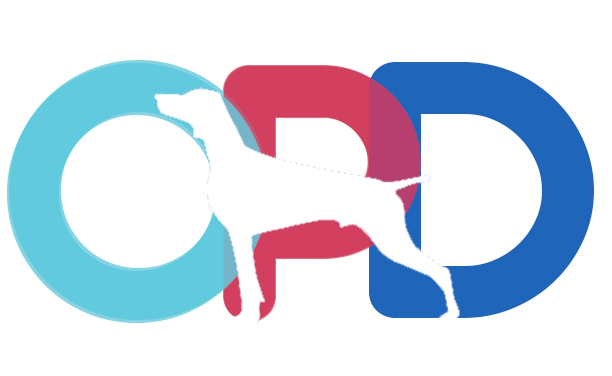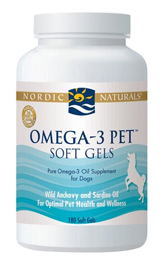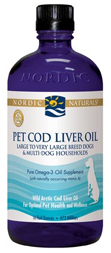If you are feeding your dog a homemade cooked meal or a healthy store-bought food, it is especially important to add supplements. Natural organic cooked dog food is great for dogs in a lot of ways, but it doesn’t always give them everything they need.
This page reviews the following supplements…
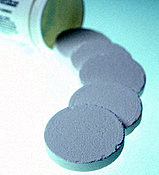 | 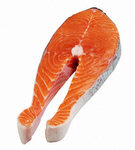 |  |
| Bone Meal | Linoleic Acid (omega-6) | Vitamin A |
| D-calcium Phosphate | Linoleic acid (omega-3) | Vitamin B |
| Eggshell Powder | Dried Beans | Vitamin C for Dogs (on a separate page) |
| Calcium Tablets or Powder | Fish | Vitamin E |
Many manufactured products have already been fortified, so be sure to read the label to determine whether additional vitamins or minerals are needed to supplement dog health. Always consult with your local veterinarian before feeding your dog any supplements.
Calcium Supplements
You should supplement dog health with calcium more than any other mineral (assuming they are not receiving enough from other sources), as it is used in:
- Bone formation
- Blood coagulation
- Muscle contraction
- Nerve impulse transmission
To supplement dog health with calcium, the following four sources are some of the most common. There are other choices as well, so in the rare case that your dog does not react well to any of them you can consult your veterinarian for alternatives.
- Bone meal for dogs
- Di-calcium phosphate for dogs
- Eggshell powder for dogs
- Calcium tablets or powder for dogs
Bone Meal for Dogs
Bone meal is the most concentrated, natural form of calcium for our little omnivores. It provides many of the essential minerals required for optimal dog health and wellness. It has been found to be extremely helpful for larger dogs – especially those that suffer from bone problems or hip dysplasia.
The most useful form of bone meal can be purchased in a powdered form made especially for animals. The advantage of buying a bone meal prepared for animals is that it will provide you with the appropriate serving size.
There are several different brands of bone meal available to supplement dog health, but seek out an organic brand to make sure you are getting the best and healthiest for your dog. We prefer Solid Gold’s Bonemeal for Dogs and Cats.
Di-calcium Phosphate for Dogs
Di-calcium phosphate is a safe and effective way to supplement dog health and regulate their intake of calcium. Because it comes in a more concentrated form, less is required per serving. Consult with your veterinarian for ideal dosing instructions for your dog.
This calcium substitute can be found in a powdered form and served to your dog, in the recommended amount, with each meal.
Eggshell Powder for Dogs
Eggshell powder is the easiest and least expensive way to supplement dog health with calcium.
It is exactly what you are thinking… take your left over egg shells, grind them up and there you have a perfect calcium supplement for your dog.
Actually, there a just a few additional steps to creating the perfect home made calcium supplement:
- After cracking the egg, rinse out the egg shell and allow it to dry. You will want at least a dozen egg shells collected in order to make the powder.
- Place the egg shells on a cooking sheet and bake at 300◦F for about ten minutes. The baking process removes excess oils and makes the shells dry and brittle so they will be easier to grind.
- Grind the shells with a seed grinder or a blender and make sure all of the sharp pieces are gone before you stop grinding.
- You’re ready to add the veterinarians recommended dosage to your dog’s meals.
Calcium Tablets or Powder for Dogs
Simple calcium tablets or calcium in a powdered form can be purchased from a pet food store or a natural food store. The tablets are labeled “plain calcium” and can be used as a calcium supplement in your dog’s diet.
Avoid calcium tablets or powder that also contain phosphorous or magnesium
The easiest form of plain calcium is the powdered form. If you prefer to buy the tablets, it is best to grind them in your blender or pill crusher. The powdered calcium can then be added to your dog’s meal without any fuss.
Oil and Fat Supplements
Add additional oil and fat to my dogs’ diet? But won’t that just make them fat?
Surprisingly, many dogs do not get enough oil and fat in their everyday diet, which is essential for peak health. And don’t worry, as long as you supplement dog health with the proper dosage your dog will not become overweight.
Fats and oils provide our dogs with two times more energy than any other food source. They are also required for the growth and maintenance of tissues in the dog’s body.
So, what happens if dogs don’t receive essential fats and oils to supplement dog health? They could encounter many health problems including:
- Heart and circulatory problems
- Impairment of vision
- Increased susceptibility to diseases and infections
- Liver and kidney degeneration
- Loss of hair
- Skin that can’t heal from wounds
- Sterility
- Symptoms similar to arthritis
- Weakness
Now it is more apparent why they are called essential fatty acids!
Check to make sure that your dog’s food is providing them with all of them. If it’s not, try supplementing their diet with a good Omega 3, 6 and 9 supplement such as Nordic Naturals Omega-3 Pet Soft Gels.
Otherwise, following are excellent natural fat and oil supplements…
| Essential Fatty Acid | Sources |
|---|---|
| Linoleic Acid (omega-6) | Safflower, sunflower, corn, evening primrose, borage oils. Also found in poultry fat and pork fat |
| Linolenic acid (omega-3) | Fish oils, canola oil, flax oil, walnuts, soy beans, freshly ground wheat germ |
| Dried Beans | Great northern, kidney, navy, soybeans |
| Fish | Salmon, mackerel, halibut, herring, sardines, albacore tuna, lake trout |
Vitamin Supplements
Many of the essential vitamins listed below are included in your dog’s kibble. As mentioned above, check the dog food labels to make sure there are adequate amounts of each vitamin included.
The labels should also include the right dosage amounts. If your dog receives the correct amount of vitamins in their food, there is no need to supplement dog health with additional vitamins unless prescribed by your veterinarian.
- Vitamin A for Dogs
- Vitamin B for Dogs
- Vitamin C for Dogs (on a separate page)
- Vitamin E for Dogs
Vitamin A for Dogs
It is important to supplement dog health with Vitamin A as it is necessary for the immune system, normal growth and development and reproduction.
In addition, it can help prevent dog cancer, slow down aging and protect your dog’s body from the harmful effects of pollutants and chemicals. The lack of Vitamin A can lead to a heap of problems, including skin and respiratory tract disorders and bone formation problems.
As long as your dog is getting the correct serving of vegetables in each meal, they are able to create their own Vitamin A from the carotene. But if you omit vegetables from your dog’s diet and they are not getting it from their kibble, another source of Vitamin A is required.
The following are some great ways to supplement dog health with vitamin A:
- Cod liver oil – This is highly recommended as an excellent source of vitamin A. Note that the taste is quite strong so your dog may take a little while to get used to it.
- Vitamin A Capsules – You can buy the lowest potency form of vitamin A capsules for your dog: 10,000 IU of vitamin A per capsule. Break open the capsule and serve with dog’s meal.
- Liquid Vitamin A – The drops are the same as the capsules but they are easier to use. Simply add the correct dosage to your dog’s food.
Vitamin B Complex for Dogs
Vitamin B is good for dog allergies, infections, and even stress. It also helps with energy, growth and the immune system.
If your dog seems overly irritable, nervous or can’t sleep, the lack of Vitamin B might be the instigator.
You can purchase vitamin B made especially for animals, such as Basic B Complex by Thorne Research, but it is also perfectly safe to use a form of vitamin B made for humans. Just make sure that you do the math and figure out the correct dosage for your dog. Assume the recommended dose on the label is for the average 150 lb human. If your dog weighs one-third of that average weight, then divide the dose by 1/3.
Vitamin E for Dogs
Extra vitamin E in the dog food diet is generally a good idea because it:
- Aids natural body functions
- Helps fight disease
- Helps to ward off the effects of pollution
Veterinarians recommend two ways to supplement dog health with vitamin E:
- Natural Vitamin E Capsules – Look for products that contain d-alpha tocopherols, which are the natural form of vitamin E. There are others that are generally synthetic, less expensive forms, but they are not as beneficial. Open a fresh capsule and serve it with your dog’s meal.
- Wheat-Germ Oil – This is a good form of natural vitamin E. Make sure not to feed your dog rancid wheat-germ oil, which is detected by a bitter aftertaste. It’s best to purchase it in capsule form and read the label to determine the appropriate amount.
You can also review related questions from other visitors here:
